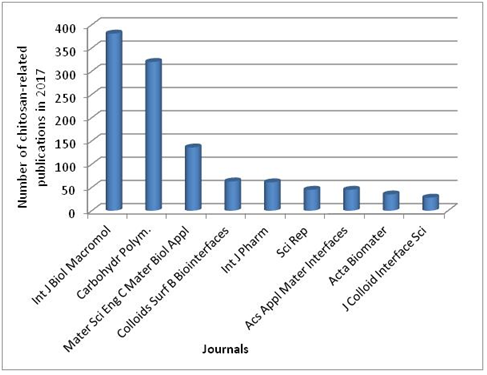Chitosan in 2017 and the potential of chitosan and COS for treatment of alzheimer´s disease

At the end of the year, we briefly reflect on which topics it was all about in the chitosan world in 2017. In addition, we present an article about Alzheimer´s disease and the neuroprotective effect of chitosan, chitosanoligosaccharides, and their derivatives.
In 2017, there were many exciting and innovative publications around chitosan and chitosan derivatives. A total number of 2804 articles with the search term chitosan were published according to PubMed (as of 11.12.2017). The majority of articles focused on the application of chitosan for nanoparticles (891), hydrogels (283), and scaffolds (204) (Table 1). The International Journal of Biological Macromolecules and Carbohydrate Polymers published most chitosan-related articles (381 and 320, respectively).
|
 |
* as of 11th December 2017 (PubMed)
The research and applications of chitosan are incredibly diverse. We already presented some interesting articles about chitosan hydrogels (April and September) and chitosan-based implant materials (February and July). At the end of the year, we would like to present an article about a widespread disease of our ageing society, which was discovered by Dr. Alois Alzheimer.
Application of chitosan, chitooligosaccharide, and their derivatives in the treatment of Alzheimer´s disease
Ouyang Q. Q., Zhao S., Li S. D., Song C.; Marine Drugs, 2017 Nov 7; 15(11). pii: E322. doi: 10.3390/md15110322.
Worldwide, the prevalence of dementia is up to 24 million persons affected and predicted to quadruple by the year 2050 [1]. The most common form is Alzheimer´s dementia, a progressive, neurodegenerative disorder characterized by memory loss, disorientation and a marked decline in intellectual capacity. Following points are the most important pathological changes of the brain tissue of Alzheimer patients and are the starting points for the treatment:
- Extracellular deposits of amyloid-beta peptide in form of senile plaques
- Intracellular neurofibrillary tangles of hyperphosphorylated tau protein
- Increase in inflammatory responses
- Apoptosis of neurons
- Acetylcholine (ACh) deficiency
- Accumulation of reactive oxygen free radicals
- Disturbed dynamic equilibrium of metal ions
None of these factors alone induces Alzheimer´s disease; however, they are all connected with the formation of amyloid-beta and tau proteins. Current treatment approaches for Alzheimer´s disease include antioxidants, vitamins, stem cells, estrogenic hormones, antihypertensives and lipid-lowering drugs, as well as phosphodiesterase inhibitors and β-secretase. Additionally the application of inhibitors of tau hyperphosphorylation and formation of intracellular neurofibrillary tangles, as well as metal chelators and non-steriodal anti-inflammatory drugs (NSAIDs) etc. is investigated.
Nowadays, the current clinical treatment methods still come with many side effects, therefore it is being searched intensively for natural neuroprotective agents which can reduce the main symptoms or even reverse the disease progress. The focus of the presented review is the current state of research on chitosan, chitosanoligosaccharides (COS) and COS derivatives, which have neuroprotective activity, immunomodulatory and anti-inflammatory effects with only minor side effects.
The review authors present different studies (see table), which investigated the neuroprotective potential of chitosan and COS in context of Alzheimer´s with different models.
| Effect of Chitosan and COS | Source | |
| Anti-neuroinflammatory |
|
[2] |
| Anti-oxidant activity |
|
[3],[4] |
| Inhibition of β-secretase |
|
[5] |
| Adsorption of copper ions |
|
[6] |
| Inhibition of amyloid-beta cleavage enzyme |
|
[7],[8] |
The referenced studies showed the neuroprotective effect of Chitosan and COS, however, further studies are necessary to overcome limitations and to provide the evidence for improvements on awareness, learning, and memory in Alzheimer´s disease animal models.
Conclusion: To sum up, Chitosan, COS and their derivatives have beneficial effects on the symptoms in development and progression of Alzheimer´s disease. However, further research is necessary to verify the neuroprotective effect of Chitosan and COS and to enable the development of chitosan-based drugs for Alzheimer´s disease.
Sources:
http://www.mdpi.com/1660-3397/15/11/322
[1] Reitz, C.; Mayeux, R. Alzheimer disease: Epidemiology, Diagnostic Criteria, Risk Factors and Biomarkers. Biochem Pharmacol. 2014 Apr 15, 88 (4): 640-651.
[2] Kim, M.S.; Sung, M.J.; Seo, S.B.; Yoo, S.J.; Lim, W.K.; Kim, H.M. Water-soluble chitosan inhibits the production of pro-inflammatory cytokine in human astrocytoma cells activated by amyloid beta peptide and interleukin-1beta. Neurosci. Lett. 2002, 321, 105–109.
[3] Jia, S.; Lu, Z.; Gao, Z.; An, J.;Wu, X.; Li, X.; Dai, X.; Zheng, Q.; Sun, Y. Chitosan oligosaccharides alleviate cognitive deficits in an amyloid-_1-42-induced rat model of Alzheimer’s disease. Int. J. Biol. Macromol. 2016, 83, 416–425.
[4] Dai, X.; Chang, P.; Zhu, Q.; Liu, W.; Sun, Y.; Zhu, S.; Jiang, Z. Chitosan oligosaccharides protect rat primary hippocampal neurons from oligomeric beta-amyloid 1-42-induced neurotoxicity. Neurosci. Lett. 2013, 554, 64–69.
[5] Yoon, N.Y.; Ngo, D.-N.; Kim, S.-K. Acetylcholinesterase inhibitory activity of novel chitooligosaccharide derivatives. Carbohydr. Polym. 2009, 78, 869–872.
[6] Huang, H.C.; Hong, L.; Chang, P.; Zhang, J.; Lu, S.Y.; Zheng, B.W.; Jiang, Z.F. Chitooligosaccharides attenuate Cu2+-induced cellular oxidative damage and cell apoptosis involving Nrf2 activation. Neurotox. Res. 2015, 27, 411–420.
[7] Jia, S.; Lu, Z.; Gao, Z.; An, J.;Wu, X.; Li, X.; Dai, X.; Zheng, Q.; Sun, Y. Chitosan oligosaccharides alleviate cognitive deficits in an amyloid-_1-42-induced rat model of Alzheimer’s disease. Int. J. Biol. Macromol. 2016, 83, 416–425.
[8] Dai, X.; Hou,W.; Sun, Y.; Gao, Z.; Zhu, S.; Jiang, Z. Chitosan Oligosaccharides Inhibit/Disaggregate Fibrils and Attenuate Amyloid beta-Mediated Neurotoxicity. Int. J. Mol. Sci. 2015, 16, 10526–10536.


